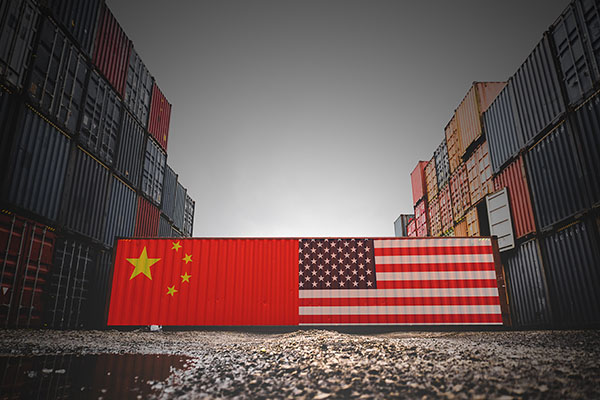Most recent U.S. tariff plans are not well received by supply chain stakeholders

When President Trump yesterday announced that the United States will be implementing a 10% tariff on $300 billion in Chinese imports, effective September 1, it understandably sent further shockwaves through the freight transportation and logistics sectors.
One reason for this was that it spoke to ongoing inaction between the United States and China in their efforts to reach a mutually beneficial trade agreement, one whose chances of coming to fruition continue to get longer by the day, it seems.
In announcing the most recent round of tariffs, President Trump said, via Twitter, that this round of tariffs will coincide with the next scheduled round of talks between the U.S. and China, adding that this will be in the form of a “a small additional Tariff of 10% on the remaining 300 Billion Dollars of goods and products coming from China into our Country. This does not include the 250 Billion Dollars already Tariffed at 25%.”
An analysis on this newest round of tariffs issued by global trade intelligence consultancy Panjiva made it clear that it is likely to jeopardize the next round of negotiations, coupled with possibly driving China to implement non-tariff retaliation such as the unreliable entities list as well as redirect state-owned enterprise spending.
What’s more, it observed that these tariffs are largely focused on consumer goods, with the firm pointing to China-originated products like smartphones, apparel and footwear, laptop PCs, toys, and videogame consoles, among others. And that is where the supply chain impact comes into play.
“All five products have peak imports between Sept. and Nov. each year, so there’s likely to be an acceleration of imports to try and beat tariffs, leading to disruption of supply chains and shipping networks,” wrote Panjiva. “Panjiva’s data indicates Dell and HP for example may be highly reliant on China and ship by sea. They may shift shipping to airfreight depending on profitability and model release considerations. The tariffs may end up being limited in scope. Tariffs on toys won’t prove popular and Hasbro has already indicated it will increase prices. Similar duties on apparel could be passed through to consumers and prove highly regressive.”
Not surprisingly, China is not pleased with this latest development, according to a report issued by its state media outlet, Xinhua, with saying it will have to take ‘necessary countermeasures; to defend its core national interests and its people's fundamental interests if the United States goes ahead with these announced tariff hikes.
Hua Chunying, China’s Foreign Ministry spokesperson, said in the report that the escalation of the trade frictions and the threat of ratcheting up tariffs by the U.S. are in line with neither the interests of the two countries' peoples nor the interests of the world, and will have a recessionary impact on the world economy.
The United States Chamber of Commerce strongly opposed President Trump’s announcement.
“Raising tariffs by ten percent on an additional $300 billion worth of imports from China will only inflict greater pain on American businesses, farmers, workers and consumers, and undermine an otherwise strong U.S. economy,” said Myron Brilliant, executive vice president and head of International Affairs, U.S. Chamber of Commerce, in a statement. “Like the President, the U.S. Chamber applauds the constructive dialogue between U.S. and Chinese negotiators. We are deeply disappointed that the two sides missed the opportunity in May to address the substantive disagreements between them and have not yet reached a comprehensive, enforceable agreement. We urge the two sides to recommit to achieving progress in the very near term before these new tariffs come into effect, and to remove all remaining tariffs as swiftly as possible.”
Similar sentiment was echoed by US-China Business Council (USCBC) President Craig Allen, who said the USCBC is concerned this recent development will drive the Chinese from the negotiating table, reducing hope raised by a second round of talks that ended this week in Shanghai.
“We’re concerned these additional tariffs will further erode our reputation as a reliable supplier, and our farmers, workers, and consumers will suffer more,” said Allen. “China does not import enough to respond in kind, so any retaliation will be qualitative and disproportionately impact US companies operating in China. We are particularly concerned about increased regulatory scrutiny, delays in licenses and approvals, and discrimination against US companies in government procurement tenders.”
Institute for Supply Management Manufacturing Business Survey Committee Chair Tim Fiore explained that the “trade war” needs to be solved, noting that there is not a consensus on a short-term solution.
“It is being used as a threat more and more often,” he said. “Using the economy as a threat to meet your political goals is a really dangerous place to be.”

Article Topics
3PL News & Resources
UPS rolls out fuel surcharge increases Descartes announces acquisition of Dublin, Ireland-based Aerospace Software Developments Shipment and expenditure decreases trend down, notes Cass Freight Index March trucking tonnage trends down, reports ATA FTR Shippers Conditions Index enters negative territory DAT March Truckload Volume Index sees modest March gains National diesel average, for week of April 22, is down for the second straight week More 3PLLatest in Logistics
Understanding the FTC’s ban on noncompetes UPS rolls out fuel surcharge increases U.S. rail carload and intermodal volumes, for week of April 20, are mixed, reports AAR Baltimore suing ship that crashed into bridge, closing port, costing jobs Intermodal growth volume remains intact in March, reports IANA Descartes announces acquisition of Dublin, Ireland-based Aerospace Software Developments Amid ongoing unexpected events, supply chains continue to readjust and adapt More LogisticsAbout the Author
Subscribe to Logistics Management Magazine

Find out what the world's most innovative companies are doing to improve productivity in their plants and distribution centers.
Start your FREE subscription today.
April 2023 Logistics Management

Latest Resources














